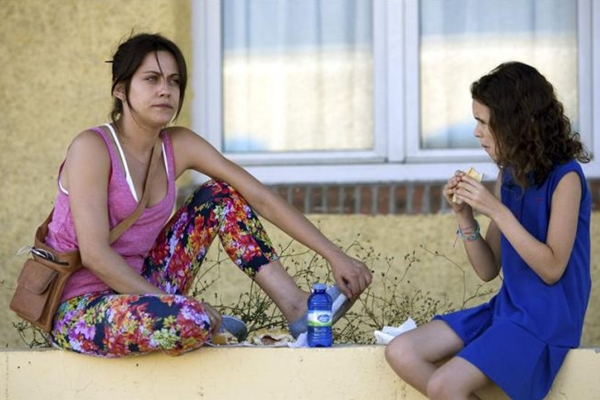
I’m reluctant to be too judgemental about this film because I missed the first 25 minutes. Reading Jonathan Holland’s review in The Hollywood Reporter, to try to discover what I missed, I have to agree with everything he says. Marsella (Marseille) appears to be a film which explores the relationships between three female characters who are affected by what is an important social issue. Sara (María León) is a 28 year-old from Andalusia who has been allowed by a judge to resume her legal position as mother to Claire (Noa Fontanals), the 10 year-old who was taken from her when Sara had alcohol and behavioural problems as a teenager. Claire has been fostered by a middle-class couple, Virginia (Goya Toledo) and Alberto, who are reluctant to let her go because they still believe Sara is not a ‘fit mother’. The narrative is constructed as a road trip taken by Sara and Claire with the aim of finding Claire’s father. All Sara knows about Jerome, who she has not seen since she became pregnant, is that he worked in a soap factory in Marseille. This genre structure should work well but the real problem with the film seems to be a sub-plot in which Sara has agreed to smuggle a package of cocaine into France. The sub-plot is necessary to the extent that Sara’s pre-occupation with this criminal task means she neglects Claire one night and the child phones Virginia because she is scared. Virginia rushes to her aid and eventually it is agreed that she will join them in the quest to find Jerome. But the scripting of the sub-plot doesn’t really work and it takes time away from the road movie which ends in a more low-key manner than we might expect.

The film is co-written and directed by Belén Macías and this is her second feature film (most of her earlier work being for television). She is one of two female directors in ¡Viva! this year dealing with middle-class couples who are/have been engaged in adopting/fostering children from working-class families (see the earlier post on L’adopció). Here, the male characters are less important and there is a real opportunity to focus on the relationships between them. I thought that when this happened it worked very well but there isn’t enough of it. The child actor is good and this was the second appearance of María León in this ¡Viva! festival (see the post on Carmina y amén) . She is a commanding presence and the social class difference between Sara and Virginia is represented through the performances of León and Goya Toledo as well as in the dialogue.
Part of that class difference refers to learning foreign languages so that Virginia (and Claire to a certain extent) have an advantage over Maria when they cross the border. The plot also includes an encounter with a truck driver (played by the engaging Eduard Fernández) and his son, an older teenager. I enjoyed this encounter which again could have been expanded but instead it is dragged into the smuggling sub-plot. Overall this film felt like a missed opportunity in which good ingredients were not allowed to come together to make a satisfying film – but perhaps that’s unkind and if I’d seen the opening I would think differently?
